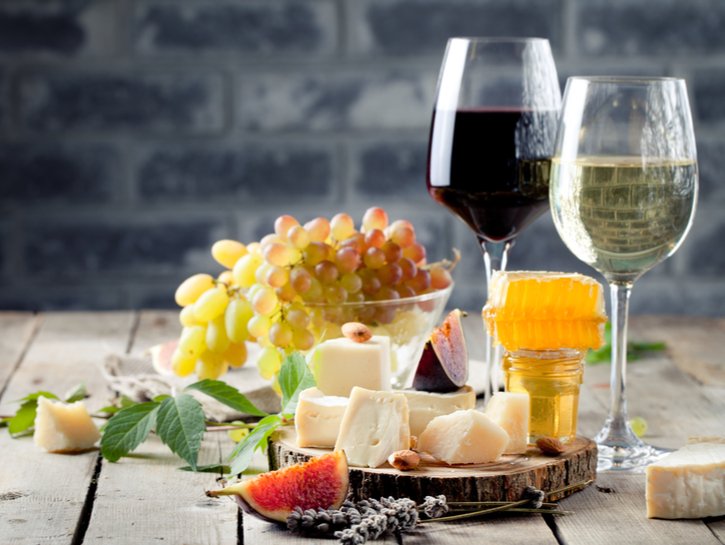Wine and cheese is a classic and classy pairing, but because of the overabundance of cheeses and wines, figuring out which drink pairs with which cheese can be overwhelming even for a seasoned diner or entertainer. After all, nothing could be worse than serving your guests mozzarella with merlot (you’ll understand in a moment).
Though there are exceptions and everybody’s tastes are different, in general, white wines pair well with soft, creamy cheeses such as brie and goat cheese. Red wines typically pair well with firmer cheeses, including parmesan and cheddar.
Here is our guide to the perfect wine and cheese pairings so you don’t look like a fool at your next event:

S_Photo/Shutterstock
White Wines
With soft and semi-soft cheeses such as brie, feta, mozzarella and blue, white wines are the way to go. Both white wines and soft cheeses have a more mild taste that complements each other when served together.
Chardonnay
Chardonnay is one of the most well known white wines. It’s loved for being light-bodied and its acidic, citrus flavors. Because this wine is so light and mild it pairs best with brie, a soft cheese with a mild, buttery and creamy taste.
Pinot Blanc
This wine is a genetic mutation of Pinot Noir and, depending on where it’s produced, can be dry or sweet. Therefore, Pinot Blanc can pair well with either mild brie or tangy feta.
Pinot Grigio
This white wine is light and has a citrus taste due to its high acidity. It’s not as sweet as Chardonnay, and pairs well with robiola, mozzarella and ricotta cheeses.
Riesling
Another high acidity wine, Riesling has an intense fruity aroma. Depending on where the wine is made, it can range from sweet to dry. This is one of the more versatile white wines when it comes to pairing. Along with soft and semi-soft cheeses like brie and blue, Rieslings also pair well with gouda, a hard cheese.
Sauvignon Blanc
Sauvignon Blanc is bold, crisp and dry with a range of flavors from zesty to flowery. It pairs well with the softest cheeses — mozzarella, goat cheese and brie.

Brent Hofacker/Shutterstock
Red Wines
Red wines pair well with semi-firm, firm or hard-aged cheese, but there are some that complement softer cheese such as goat cheese or gouda. Red wines are often dry and therefore go well with sharper cheeses.
Cabernet Sauvignon
Cabernet Sauvignon is a dark, full-bodied red wine with a savory taste ranging from black cherry to bell pepper. It’s a wine with a kick, and therefore goes well with sharp cheeses — particularly cheddar, gouda and parmesan.
Chianti
Chianti is a very dry Italian wine that tastes best when consumed with food. It has a flavor akin to tart cherries and pairs well with hard cheeses parmesan and gouda.
Merlot
Merlot is one of the sweetest red wines. Merlot is much bolder than pinot noir, but not as bold as Sauvignon Blanc. The wine pairs best with semi-hard and hard cheeses Monterey Jack, gouda and cheddar.
Pinot Noir
Pinot Noir is a light-bodied red wine with a more fruity taste than most red wines. Cheeses made from sheep’s milk pair the best with Pinot Noir, but cheeses from other sources can also complement the wine. Feta and brie are two cheeses that are best served alongside Pinot Noir.
Port
Port is a sweet and highly intoxicating fortified wine, similar to Sherry and Madeira. Though it’s often served as a dessert wine due to its sugary contents, Port is also a delicious complement to blue cheese and gorgonzola.
Zinfandel
Zinfandel, like Pinot Noir, is a light-bodied red wine. But unlike Pinot Noir, it has a high level of acidity that makes its taste much bolder. This wine pairs well with soft feta cheese, semi-soft blue cheese and hard gouda.

beats1/Shutterstock
Sparkling Wines
This type of wine is made when containers are fully sealed during the fermentation process and the carbon dioxide is unable to escape, resulting in foam and bubbles when the wine is uncorked. Champagne and Prosecco are both sparkling wines, pairing well with buttery and earthy foods such as pasta and seafood. When it comes to cheeses, these light wines complement buttery cheese such as baby swiss, Colby and gouda.
